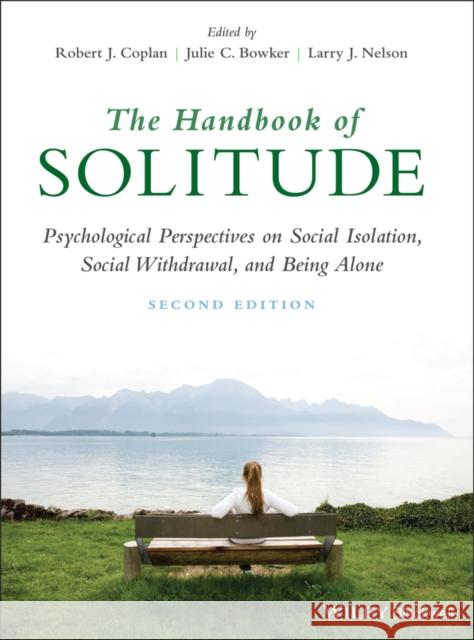The Handbook of Solitude: Psychological Perspectives on Social Isolation, Social Withdrawal, and Being Alone » książka



The Handbook of Solitude: Psychological Perspectives on Social Isolation, Social Withdrawal, and Being Alone
ISBN-13: 9781119576389 / Angielski / Twarda / 2021 / 480 str.
The Handbook of Solitude: Psychological Perspectives on Social Isolation, Social Withdrawal, and Being Alone
ISBN-13: 9781119576389 / Angielski / Twarda / 2021 / 480 str.
(netto: 831,06 VAT: 5%)
Najniższa cena z 30 dni: 865,47
ok. 30 dni roboczych.
Darmowa dostawa!
I. Theoretical Perspectives1. Alone Again: Revisiting Psychological Perspectives on SolitudeRobert J. Coplan (Carleton University, Canada), Julie C. Bowker (University at Buffalo, The State University of New York, USA), and Larry J. Nelson (Brigham Young University, USA)2. Evolutionary and Neuroscientific Perspectives on Adaptive ShynessRaha Hassan, Taigan MacGowan, Kristie L. Poole, and Louis A. Schmidt (McMaster University, Canada)3. An Attachment Perspective on Solitude and LonelinessMario Mikulincer (Interdisciplinary Center Herzliya, Israel), Phillip R. Shaver (University of California Davis, USA), and Inbal Gal (Interdisciplinary Center Herzliya, Israel)4. What Does Animal (Nonhuman) Research Tell us About Social Deprivation and Social Isolation?Selin Zeytinoglu and Nathan Fox (University of Maryland, USA)5. The Origins of Beneficial Solitude: Psychoanalytical PerspectivesEvangelia Galanaki (University of Athens, Greece)6. Culture, Social Withdrawal, and DevelopmentXinyin Chen and Mengting Liu (University of Pennsylvania, USA)II. Solitude across the Life Span7. Behavioral Inhibition and Psychopathology in ChildhoodEmma E. Mumper and Daniel Klein (Stony Brook University, USA)8. Solitary Activities in from Early Childhood to Adolescence: Causes, Content, and ConsequencesRobert J. Coplan, Laura L. Ooi, and Will E. Hipson (Carleton University, Canada)9. Manifestations of Solitude in Interpersonal Contexts and Negative Peer Experiences: Peer Rejection, Exclusion, and VictimizationGary W. Ladd (Arizona State University, USA), Becky Kochenderfer-Ladd (Arizona State University, USA), Idean Ettekal (Texas A & M University, USA), and Brandon Clifford (Arizona State University, USA)10. Social Withdrawal During Adolescence: The Role of PeersJulie C. Bowker (University at Buffalo, The State University of New York, USA), Hope I. White (University at Buffalo, The State University of New York, USA), and Rebecca G. Etkin (Yale University School of Medicine, USA)11. Social Withdrawal During Emerging AdulthoodLarry J. Nelson and Mallory Millet (Brigham Young University, USA)12. Current and Future Paths in Research on SinglehoodKatarzyna Adamczyk (Adam Mickiewicz University, Poland)13. Social Isolation, Loneliness, and Solitude in Older AdulthoodChristiane Hoppmann(University of British Columbia, Canada), Jennifer Lay (Chinese University of Hong Kong, Hong Kong), Theresa Pauly (University of British Columbia, Canada), and Elizabeth Zambrano(University of British Columbia, Canada)III. Understanding Solitude: Constructs, Processes, and Contexts14. Social Approach and Avoidance MotivationsJana Nikitin (University of Basel, Switzerland) and Simone Schoch (Zurich University of Teacher Education, Switzerland)15. Ostracism and SolitudeEric D. Wesselmann (Illinois State University, USA), Kipling D. Williams (Purdue University, USA), Dongning Ren (Tilburg University, The Netherlands), and Andrew H. Hales (University of Virginia, USA)16. The Possibilities of Aloneness and Solitude: Developing an Understanding Framed Through the Lens of Human Motivation and NeedsThuy-vy T. Nguyen (University of Durham, UK), Netta Weinstein (Cardiff University, UK), and Richard M. Ryan (Australian Catholic University, Australia)17. Getting even Lonelier? Psychological Well-Being and Problematic Use of Media in the Over-Connected SocietyJung-Hyun Kim (Sogang University, South Korea)18. New Media and Solitude: Implications for Peer RelationsKaitlyn Burnell (Duke University, USA), Madeleine J. George, (Purdue University, USA), and Marion Underwood (Purdue University, USA)19. Alone vs. Together: Finding the Right Balance for CreativityPaul B. Paulus (University of Texas at Arlington, USA), Jared B. Kenworthy (University of Texas Arlington, USA), and Laura R. Marusich (U.S. Army Combat Capabilities Development Command, Army Research Laboratory, USA)20. Solitude as Means of Obtaining Mental Rest in Skilled Athlete PopulationsDavid W. Eccles (Florida State University, USA), Alexander Kazmier (Durham University, UK), and Christopher Ehrhart (Florida State University, USA)21. From Shyness to Social Anxiety: Understanding Solitude in the Context of ImmigrationYiyuan Xu (University of Hawaii at Manoa, USA), Charissa S.L. Cheah (University of Maryland Baltimore County, USA), Craig H. Hart (Brigham Young University, USA), and You Jung Seo (University of Maryland Baltimore County, USA)IV. Solitude, Health, and Psychopathology22. Introversion, Solitude, and HappinessJohn M. Zelenski, Karin Sobocko, and Deanna C. Whelan (Carleton University, Canada)23. Solitary and Social Aspects of Restoration in NatureKalevi Korpela (Tampere University, Finland) and Henk Staats (Universiteit Leiden, Netherlands)24. Intentional Solitude and Mindfulness: The Benefits of Being AloneChelom E., Leavitt (Brigham Young University, USA), Bethany Butzer (The University of New York in Prague, Czech Republic), Rebecca Clarke (Brigham Young University, USA), and Kami Dvorakova (Pennsylvania State University, USA)25. Loneliness and Associated Mental Health Sequelae in Individuals with Autism Spectrum DisorderLauren Baczewski and Connie Kasari (University of California, Los Angeles [UCLA] USA)26. Social Anxiety Disorder and Emotional SolitudeLynn E. Alden and Klint Fung (University of British Columbia, Canada)27. Hikikomori: Risks and Consequences of Extreme Self-Imposed Social MarginalizationPaulWong and Tim M.H. Li (University of Hong Kong, Hong Kong)28. Solitary Confinement is not Solitude: The Worst Case Scenario of Being Alone in PrisonCraig Haney (University of California, Santa Cruz, USA)V. Magnum Opus29. Social Withdrawal in Childhood: A Personal History of Theory and Research that Guided a Program of Developmental ResearchKenneth H. Rubin (University of Maryland, USA)
Robert J. Coplan, PhD, is Professor in the Department of Psychology at Carleton University and Director of the Pickering Centre for Research in Human Development. His research focuses on the development and implications of shyness and social withdrawal, from early childhood to emerging adulthood, and across cultures.Julie C. Bowker, PhD, is Associate Professor of Psychology at the University at Buffalo, State University of New York. Her research focus is on socio-emotional development and psychopathology during late childhood and early adolescence.Larry J. Nelson, PhD, is Professor in the School of Family Life at Brigham Young University in Provo, Utah. His research focuses on factors related to flourishing and floundering in the transition to adulthood including the role of social withdrawal, parenting, and culture.
1997-2026 DolnySlask.com Agencja Internetowa
KrainaKsiazek.PL - Księgarnia Internetowa









